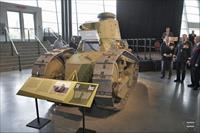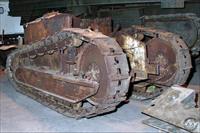MAP CONTROLS: Use slider or mousewheel to zoom, and hold down left mouse button
to drag.
KEY: Location markers are coloured from Green meaning exact to Red meaning
gone or unknown (details here)
|
Unique ID:
|
2486
|
|
Added to Database:
|
22 March 2014
|
|
Last Edited:
|
23 March 2014
|
|
Type (ID):
|
M1917 Six-Ton (6120)
|
|
Model (ID):
|
M1917 Six-Ton (6120)
|
|
Location Category (ID):
|
Canadian War Museum (8100)
|
|
Location (ID):
|
LeBreton Gallery (8130)
|
|
Serial Number: |
|
|
Registration: |
|
|
Name: |
|
|
Other Identification: |
|
|
Collection Reference: |
|
|
Links: |
CWM – War Museum displays restored rare tank
CWM 2
Ottawa Citizen
CanadianSoldiers.com
|
|
References: |
|
|
Associated Tanks: |
|
Location History:
(see map) |
1: Van Dorn Iron Works - Cleveland - Ohio, USA (Primary manufacturer)
2: Base Borden Military Museum, Canadian Forces Base Borden, Borden, Ontario, Canada (Training 1940 – ca 1943)
3: Bracebridge Ontario, Canada (Used as logging tractor)
4: Reynolds Museum – Alberta, Canada (Until 1997)
5: Vimy House, Centretown West, Ottawa, Ontario, Canada (Until ca2004)
6: Canadian War Museum, LeBreton Flats, Ottawa, Ontario, Canada (Current location)
|
Text in original Preserved French Tanks publication:
[No entry]
Text in Preserved French Tanks Update:
[No entry]
Text in original Preserved Tanks In Canada publication:
In the early days of the Second World War Canada imported about 250 of these tanks, which were sold as scrap metal by the then-neutral United States. The tanks arrived at Camp Borden (now Canadian Forces Base Borden) in October 1940 and remained in service as training vehicles for the next three years. Although slow and unreliable, they were a useful stopgap until newer tanks became available. In 1943, many were scrapped for the much-needed steel they contained, while a few were sold as surplus for use as tractors. Such had been the fate of the War Museum’s M1917, which was modified and used for years as a logging tractor near Bracebridge, Ontario. The M1917 was acquired from the Reynolds Museum in Alberta in 1997. It was in very poor condition when it arrived at the War Museum and required extensive restoration and reconstruction work – including an international search for surviving parts from other tanks and the construction of a new upper hull and turret. Museum staff, volunteers, and contractors spent about 5,000 hours on the restoration and reconstruction, which was generously supported by Richard Iorweth Thorman, the Friends of the Canadian War Museum, and DEW Engineering. (Source: CWM).
Prior to restoration the vehicle was in poor shape; the upper hull and turret had been removed and discarded. M1917 tracks and running gear salvaged from the Kingston, Ontario rifle ranges were mated with the surviving hull, and turret and remaining hull pieces were fabricated in Ottawa by DEW Engineering. (Source: CanadianSoldiers.com).
|
August 2012
|
| | | |  | | | | |
1: During the unveiling
Taken: 13 August 2012
Contributor: CWM
Photo ID: 9512
Added: 22 March 2014
Filename: 0865edit...
Views: 255
Select/Has Priority: 21/0
|
|
|
|
|
|
|
1997
|
| | | |  | | | | |
2: Before restoration
Taken: 1997 (Estimated)
Contributor: CWM
Photo ID: 9513
Added: 22 March 2014
Filename: media-be...
Views: 312
Select/Has Priority: 21/0
|
| | | | | |
|
|